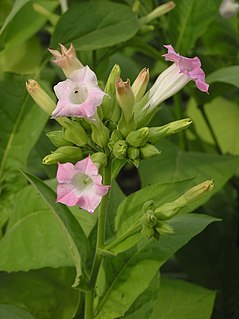
Nicotiana is a genus of herbaceous plants and shrubs in the family Solanaceae, that is indigenous to the Americas, Australia, south west Africa and the South Pacific. Various Nicotiana species, commonly referred to as tobacco plants, are cultivated as ornamental garden plants. N. tabacum is grown worldwide for production of tobacco leaf for cigarettes and other tobacco products.

Rio Grande do Sul is a state in the southern region of Brazil. It is the fifth-most-populous state and the ninth largest by area. Located in the southernmost part of the country, Rio Grande do Sul is bordered clockwise by Santa Catarina to the north and northeast, the Atlantic Ocean to the east, the Uruguayan departments of Rocha, Treinta y Tres, Cerro Largo, Rivera and Artigas to the south and southwest, and the Argentine provinces of Corrientes and Misiones to the west and northwest. The capital and largest city is Porto Alegre. The state has the highest life expectancy in Brazil, and the crime rate is relatively low compared to the Brazilian national average. Despite the high standard of living, unemployment is still high in the state, as of 2017. The state has 5.4% of the Brazilian population and it is responsible for 6.6% of the Brazilian GDP.

The coat of arms of Brazil was created on 19 November 1889, four days after Brazil became a republic. It consists of the central emblem surrounded by coffee and tobacco branches, which were important crops in Brazil at that time. In the round shield in the center, the Southern Cross can be seen. The ring of 27 stars around it represents Brazil's 26 states and the Federal District.

Venâncio Aires is a city in the state of Rio Grande do Sul, Brazil. It is the capital of chimarrão, a kind of drink, with approximately 72,000 inhabitants. The main industry is tobacco.

Nicotiana glauca is a species of flowering plant in the tobacco genus Nicotiana of the nightshade family Solanaceae. It is known by the common name tree tobacco. Its leaves are attached to the stalk by petioles, and its leaves and stems are neither pubescent nor sticky like Nicotiana tabacum. It resembles Cestrum parqui but differs in the form of leaves and fusion of the outer floral parts. It grows to heights of more than two meters.

Nicotiana rustica, commonly known as Aztec tobacco or strong tobacco, is a rainforest plant in the family Solanaceae. It is a very potent variety of tobacco, containing up to nine times more nicotine than common species of Nicotiana such as Nicotiana tabacum. More specifically, N. rustica leaves have a nicotine content as high as 9%, whereas N. tabacum leaves contain about 1 to 3%. The high concentration of nicotine in its leaves makes it useful for producing pesticides, and it has a wide variety of uses specific to cultures around the world. However, N. rustica is no longer cultivated in its native North America, as N. tabacum has replaced it.

Santa Cruz do Sul is a city in central Rio Grande do Sul, Brazil. The city has an estimate 131,000 inhabitants as of 2020 and sits about 150 km from the capital city of the state, Porto Alegre. The city enjoys a high standard of living and gross income per capita is 2.5 times greater than that of the state of Rio Grande do Sul as a whole.

Nicotiana tabacum, or cultivated tobacco, is an annually grown herbaceous plant. It is found in cultivation, where it is the most commonly grown of all plants in the genus Nicotiana, and its leaves are commercially grown in many countries to be processed into tobacco. It grows to heights between 1 and 2 meters. Research is ongoing into its ancestry among wild Nicotiana species, but it is believed to be a hybrid of Nicotiana sylvestris, Nicotiana tomentosiformis, and possibly Nicotiana otophora.

Anabasine is a pyridine and piperidine alkaloid found in the Tree Tobacco plant, a close relative of the common tobacco plant. It is a structural isomer of, and chemically similar to, nicotine. Its principal (historical) industrial use is as an insecticide.

Amaral Ferrador is a municipality in the state of Rio Grande do Sul, Brazil. The population is 7,085 in an area of 506.46 km². It is situated on the Camaquã River.
Nicotiana tomentosiformis is a perennial herbaceous plant. It is a wild species of tobacco native to the Yungas Valley region in the eastern piedmont of the Andes Mountains, primarily in Bolivia.
Nicotiana otophora is a perennial herbaceous plant. It is a wild species of tobacco native to the Andes Mountains of Bolivia and Argentina.

Argyrosticta is a genus of moths of the family Noctuidae. The genus was erected by Jacob Hübner in 1821.
Atrephes is a genus of moths of the family Noctuidae. The genus was erected by E. Dukinfield Jones in 1908.

Feigeria is a genus of moths of the family Erebidae. The genus was erected by Emilio Berio in 1990.

Agrotis brachystria is a species of moth of the family Noctuidae. It is found in Argentina and Rio Grande do Sul in Brasil.

Rachiplusia ou, the gray looper moth, is a moth of the family Noctuidae. The species was first described by Achille Guenée in 1852. It is found in the southern and eastern parts of the United States, Montana, Nova Scotia, from Mexico to Venezuela to Ecuador and the Dominican Republic.

Helicoverpa assulta, the oriental tobacco budworm, is a moth of the family Noctuidae. H. assulta adults are migratory and are found all over the Old World Tropics including Asia, Africa, and Australia.

Souza Cruz S.A. is a Brazilian tobacco manufacturing company based in Rio de Janeiro. Souza Cruz is a subsidiary of British American Tobacco. The company was founded in 1903 by the Portuguese immigrant Albino Souza Cruz, who in 1914 converted the company into a corporation and transferred the controlling interest to British American Tobacco.

Hypotrix purpurigera is a moth of the family Noctuidae. It is found in Brazil.














